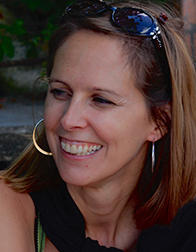Nadia Bruyndonckx is a PhD in biology who joined the team of the Save Our Seas Foundation in spring 2013. Based in Geneva, she works with Michael Scholl as an executive assistant and scientific advisor. Switzerland is a landlocked country and she believes that working jointly with the Department of Ecology and Evolution would help swiss students to get involved in marine science and conservation.
Animals and nature have fascinated Nadia since her childhood so it was a natural progression for her to study biology to better understand the wonders of the animal kingdom. For her PhD she studied the co-evolution of bats and their parasites using several molecular tools and was involved in bat conservation. Bats, she established, are fascinating animals that can make people sensitive to environmental issues. Having completed her PhD, Nadia became the coordinator of a doctoral programme, organising courses and workshops for PhD students in ecology and evolution. In 2012 she took over the administration of a biology department, dealing with finances and human resources.
A field biologist familiar with unpopular animals, Nadia also has solid expertise in administrative management. But it was while qualifying for her advanced diver certificate that she became sensitive to the vulnerability of the oceans and the importance of preserving them. After several years in science and administration, she decided to use her diverse skills to help promoting the conservation and protection of marine environments.
Collaborations: groups of Prof. Philippe Christe, Prof. Nicolas Salamin and Dr. Luca Fumagalli.
2013 - now
Executive Assistant & Scientific Advisor, Save Our Seas Foundation, Geneva, Switzerland
2011 - 2013
Administrative assistant, Department of Ecology & Evolution, University of Lausanne, Switzerland
2009 - 2013
Doctoral program coordinator, inter-university Doctoral Program in Ecology and Evolution, CUSO & University of Lausanne, Switzerland
2010 - 2011
Biology teacher, Lausanne, Switzerland
2003 - 2009
PhD under the supervision of Prof. Philippe Christe, Department of Ecology & Evolution, University of Lausanne, Switzerland

